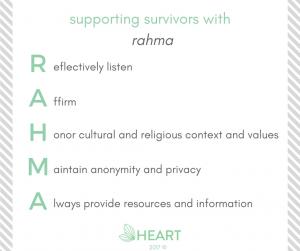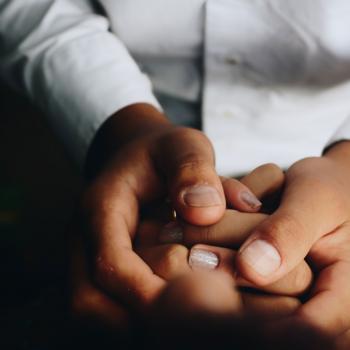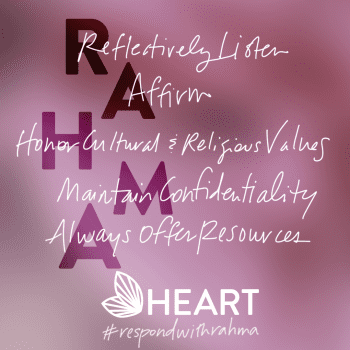With increased media attention on sexual violence, it seems that each week reveals a new accusation in the celebrity world. Although this issue is now getting the spotlight and it seems to many that there is a sudden increase in sexual violence, the reality is that for too long, these violations went unchecked. Even now, there are still many communities of victims that feel they have to remain silent and unnamed, due to the lifelong physical, social, and emotional consequences they may face in their communities for coming forward.
Too often, victims of sexual assault bravely reach out to their loved ones for support, guidance, and resources, and are met with blame and shame, rather than healing and support. These negative reactions often have lifelong impact on victims, their families, and their communities. In fact, research shows that negative reactions are often worse than no reaction at all.
However, the data remains grim: The CDC estimates that 1 out of 4 girls and 1 out of 6 boys are victims of sexual violence before the age of 18. There is no reason to believe that these numbers are any different in Muslim communities. This means either you or someone you know has had this experience, and that there is a high likelihood that you may find yourself in a situation having to respond to a victim that is disclosing for the first time. How you respond in that moment of initial disclosure can have a profound impact on the survivor and can prevent a domino effect of additional harm on the survivor, their family, and the community. Not believing a victim, blaming them for the assault, interrogating them, or siding with the abuser can have a lifelong impact on a victim’s ability to heal, seek counseling and justice, and feel safe. Moreover, statistics also indicate that those who perpetrate sexual violence are likely to re-offend and therefore not taking a disclosure seriously also puts others at risk. How you respond can create an important culture shift that centers and prioritizes the needs of sexual assault victims.
Understandably, disclosures can be shocking, and many find it hard to find the right words to say. This is even harder if their abuser is someone you may know, love, and respect. Here are a few easy tips, using the acronym rahma, inspired by the Arabic word for compassion, to help you compassionately respond to your loved one in a way that promotes healing and justice*:
RAHMA stands for:
Reflectively Listen
Affirm & Believe
Honor cultural and religious context & values
Maintain anonymity & privacy
Always Provide Resources and Information
Reflectively listen, with compassion
When an individual initially discloses to you, reflectively listen to what they are telling you. This is a fancy way of saying “repeat what they are asking back to them.” This helps the person inquiring in several ways:
- It lets them know you understand what they’re saying
- It lets them know that you are listening to them
- It helps you clarify exactly what the individual needs from disclosing to you
If a person expresses a feeling or emotion, be sure to reflect that back to them so they feel understood and heard.
Affirm & Believe, with compassion
Affirm the step the survivor has taken to disclose to you. Many survivors make “first contact” about sexual violence after careful deliberation and hesitation, and you may be the first person that someone has talked to about these issues. Disclosing to someone is an incredibly bold and brave step.
Your affirmations can include “I believe you” “You are very brave for speaking up about this” or “You are not alone” or “This is not your fault.” Affirm any feelings they may have about the situation – “A lot of people feel what you are feeling right now,” “It is okay to feel upset/angry about this situation.” Do ask open ended questions such as “How can I help you?” and “How are you feeling?” Do not ask for details of the assault or questions in an accusatory tone.
Honor cultural & religious context and values, with compassion
There are numerous cultural myths that are rampant in the Muslim communities that not only perpetuate misinformation, but may also contribute to victim blaming, violence, and misogyny. While it is important to address these myths and misinformation and offer accurate information—the manner with which you do it is key. Addressing these issues with great understanding, compassion, and empathy is essential. Remember, as much as you may dislike a cultural value or attitude, it may be something the individual holds on to and deeply respects. Whenever you are addressing a survivor’s concern, always ask yourself the following questions: What is your role in this process? Is it ethical for you to challenge and question their cultural understanding? What would be the impact of you doing so? Raise awareness about the issue and correct misinformation, but without making the individual feel judged or stupid for holding such a value or belief. You might get concerns about social consequences like breaking up families, communities, or never getting married. Be sure to address these concerns in a matter-of-fact manner, and correct the myth while exhibiting understanding that they are not alone in having such concerns.
Maintain Privacy
Maintaining privacy, especially in situations of sexual violence, and especially if the situation involves a tight-knit community, is of utmost priority. Muslim communities do not speak openly about matters of sexual health, let alone sexual violence. Because of this, there is a lot of shame and embarrassment that individuals feel when disclosing. It is extremely important to honor the individual’s privacy. Do not share their identity with anyone, or even identifying details, and follow the lead of lawyers and advocates who are trained in maintaining confidentiality. Even sharing details you may not consider as immediately identifying, like the region they live in, or their age, with others may compromise their identity especially if they come from a tight knit community.
Always provide resources & information
The final step to responding to a disclosure: providing resources and information. Sexual violence is about having power and control snatched from the survivor, and so one of the biggest roles we can play as advocates is to give that control back to them. Acknowledge the range of options available to them, including filing a police report, getting a rape kit at a hospital, getting tested for sexually transmitted infections, seeking private counseling, or calling a hotline. Meet them where they are, and gently offer resources and information with compassion, but respect their agency to make the decision that is best for them.
Because victims usually disclose to their friends or family – a parent, a friend, a teacher, or a relative – everyone should have the tools and language to respond with RAHMA: in a way that is victim-centric, offers compassion, and provides them with the resources and support they need to feel empowered as they make decisions about their healing and justice.
*It’s important to note that if the individual disclosing is a minor, there are additional considerations to take such as mandated reporting requirements.













